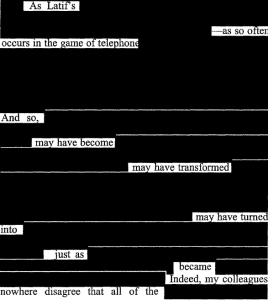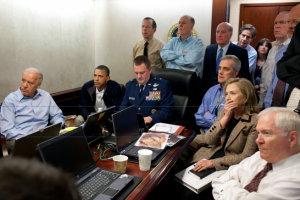It’s been amusing to see how Obama apologists have taken Lawfare’s very helpful explainer on the NDAA’s detainee provisions to pretend that their president isn’t signing a bill that he believes authorizes the indefinite detention of American citizens.
Take this example from Karoli.
Here’s how she claims that Lawfare proves that the bill doesn’t authorize indefinite detention of American citizens.
Key point rebutting the contention that the indefinite detention provisions apply to United States citizens:
Section 1022 purports not merely to authorize but to require military custody for a subset of those who are subject to detention under Section 1021. In particular, it requires that the military hold “a covered person” pending disposition under the law of war if that person is “a member of, or part of, al-Qaeda or an associated force that acts in coordination with or pursuant to the direction of al-Qaeda” and is participating in an attack against the United States or its coalition partners. The president is allowed to waive this requirement for national security reasons. The provision exempts U.S. citizens entirely, and it applies to lawful permanent resident aliens for conduct within the United States to whatever extent the Constitution permits. It requires the administration to promulgate procedures to make sure its requirements do not interfere with basic law enforcement functions in counterterrorism cases. And it insists that “Nothing in this section shall be construed to affect the existing criminal enforcement and national security authorities of the Federal Bureau of Investigation or any other domestic law enforcement agency with regard to a covered person, regardless whether such covered person is held in military custody.” [emhasis original]
Of course, Karoli can only make this claim by pretending that section 1022–the section that makes military detention presumptive for non-citizens but doesn’t foreclose military detention of US citizens–is section 1021–the section that affirms the President’s authority to indefinitely detain people generally. And she can also make this claim only by ignoring the section where Lawfare answers her question directly.
Does the NDAA authorize the indefinite detention of citizens?
No, though it does not foreclose the possibility either.
The NDAA doesn’t do anything to exempt Americans from indefinite detention. And the reason it doesn’t–at least according to the unrebutted claims of Carl Levin that I reported on over a month ago–is because the Administration asked the Senate Armed Services Committee to take out language that would have specifically exempted Americans from indefinite detention.
The initial bill reported by the committee included language expressly precluding “the detention of citizens or lawful resident aliens of the United States on the basis of conduct taking place within the United States, except to the extent permitted by the Constitution of the United States.” The Administration asked that this language be removed from the bill. [my emphasis]
So the effect is that (as Lawfare describes in detail) the bill remains unclear about whether Americans can be detained indefinitely and so we’re left arguing about what the law is until such time as a plaintiff gets beyond the Executive Branch’s state secrets invocations to actually decide the issue in court.
But what’s not unclear is what Obama believes about the bill he’s signing. That’s true not just because (again, according to the unrebutted statement of Carl Levin) the Administration specifically made sure that the detention provisions could include Americans, but because the Administration used a bunch of laws about detention to justify the killing of American citizen Anwar al-Awlaki.
And, as Charlie Savage has reported, the legal justification the Administration invented for killing an American citizen in a premeditated drone strike consists of largely the same legal justification at issue in the NDAA detainee provisions.
- The 2001 AUMF, which purportedly defined who our enemies are (though the NDAA more logically includes AQAP in its scope than the 2001 AUMF)
- Hamdi, which held the President could hold an American citizen in military detention under the 2001 AUMF
- Ex Parte Quirin, which held that an American citizen who had joined the enemy’s forces could be tried in a military commission
- Scott v. Harris (and Tennesee v. Garner), which held that authorities could use deadly force in the course of attempting to detain American citizens if that person posed an imminent threat of injury or death to others
In other words, Obama relied on substantially the same legal argument supporters of the NDAA detainee provisions made to argue that indefinite detention of American citizens was legal, with the addition of Scott v. Harris to turn the use of deadly force into an unfortunate side-effect of attempted detention. [original typos corrected]
We don’t have to guess about what the Administration believes the law says about detention and its unfortunate premeditated side effect of death because we have the dead body of Anwar al-Awlaki to make it clear that the Administration thinks Hamdi gives the Executive expansive war powers that apply even to American citizens.
You don’t get to the targeted killing of American citizens (which, after all, doesn’t offer the possibility of a habeas corpus review) without first believing you’ve got the power to indefinitely detain Americans (with habeas review).
Now, to Obama’s, um, credit, I don’t think he actually wants to indefinitely detain Americans. He seems to have figured out that the civilian legal system is far more effective–and plenty flexible–for detaining terrorists for long (and usually life, in the case of actual terrorist attackers) sentences. He doesn’t necessarily want to use the power of indefinite detention he believes he has, but (as the unrebutted claims of Carl Levin make clear) he wants to be able to continue to claim he has it, probably because a bunch of other claimed authorities–demonstrably, targeted killing, and probably some kinds of domestic surveillance–depend on it.
But that doesn’t excuse what he will do by signing the bill into law. He’s signing a bill that grants the executive broad powers of detention that he believes to include American citizens. And while he may not want to detain Americans, that’s no guarantee that President Newt won’t want to.
 In her Gitmo anniversary piece, Dahlia Lithwick, piggybacking on Adam Liptak’s earlier report, used the extensive redactions in the DC Circuit Opinion overturning Adnan Latif’s habeas petition to illustrate how little the courts are telling us about his fate, our detention program, and its impact on the most basic right in this country, habeas corpus.
In her Gitmo anniversary piece, Dahlia Lithwick, piggybacking on Adam Liptak’s earlier report, used the extensive redactions in the DC Circuit Opinion overturning Adnan Latif’s habeas petition to illustrate how little the courts are telling us about his fate, our detention program, and its impact on the most basic right in this country, habeas corpus.


